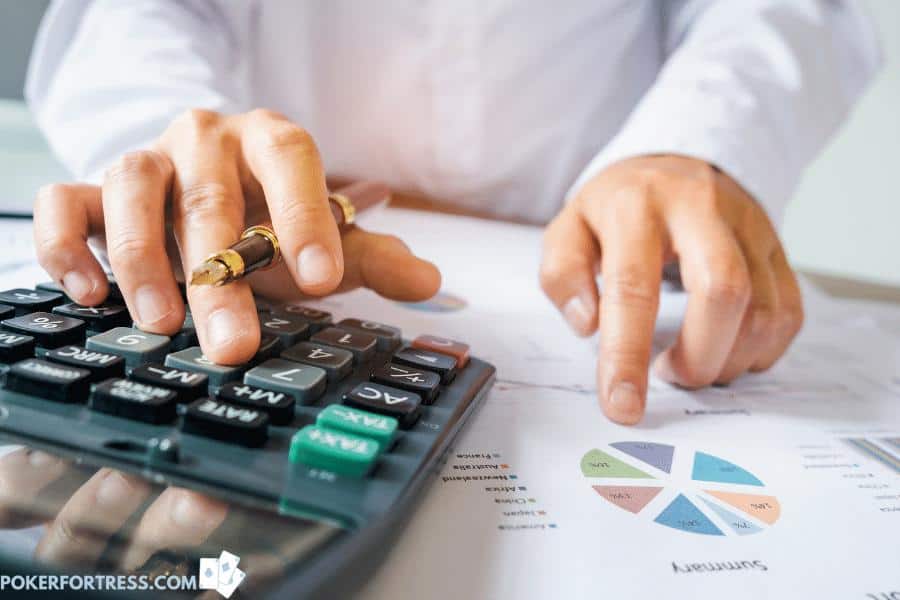Calculate whether you’re getting the right pot odds to call to try and hit one of your poker outs – and don’t forget to factor in the fact that if there are multiple players to act after you, there’s a chance you may get raised and subsequently forced out of the hand. To calculate your poker equity - or how often you should win a hand, you can use a simple formula. Count how many outs you have. For example, if you're drawing to a flush, you have 13 suited cards, two in your hand, two on the board - leaves 9 outs. The chance of you hitting on the turn is 9.4 (+4) = 40%. Take a look at pokersource if you have reasonably strong C abilities. It's not simple, I'm afraid, but some of the things you're looking for are complex. The poker-eval program that uses the library will probably do much of what you want if you can get the input format correct (not easy either). You can check them out. Is the 'Always on Top' button. Replay hands you have played. BOL Calculator win odds are calculated with a sophisticated mathematical algorithm based on your pocket cards, the community cards, and the number of players in the hand. BOL Calculator offers accurate win poker odds that you can trust. The formula for establishing the odds can also be stated as (1/p) - 1: 1, where p is the aforementioned probability. The values given for Probability, Cumulative probability, and Odds are rounded off for simplicity; the Distinct hands and Frequency values are exact.

Odds in poker are important, just like in any other game of chance. Yet, in games such as roulette or in slot machines, it’s fairly easy to understand how odds work right away.
That’s a tad more difficult in poker, as you need to remember how to do some basic math to get the odds.
But why are odds important in the first place? Well, you need to know how likely you are to win and what to do, once you have it all in numbers. Naturally, odds cannot help you win in poker, but they can help you make some important decisions.
What Are Outs?
In one of the past articles, we discussed what outs actually are. However, we will repeat that briefly to talk about odds, as outs and odds in poker are connected in several ways.
Outs are basically cards that we need to make a complete poker hand. Let’s say that we have an Ace and a Queen of hearts, and the flop showed a two and a seven of hearts, and a five of clubs. In this case, we have a hand that contains four cards that are all hearts.
Therefore, it means that we need another card of hearts to complete a hand. This card is called an out.
Calculating the Odds
To calculate the odds, we need to know the exact number of outs that we have for a hand. In our case, it’s important to know that each of the suits contains a total of 13 cards in a deck. In other words, there are 13 hearts cards in the deck, and we have four of them that are already part of our hand.
Poker Outs Calculator
Therefore, the number of outs, in this case, is nine, meaning that there are nine cards that can help us to complete our hand. However, converting that to percentages is a bit more complicated.
First of all, you need to subtract the number of cards that you’re able to see from the total number of cards in the deck (in this case it’s five — two in your hand and three on the flop). Therefore, 52 – 5 = 47.
The next thing to do is to subtract the number of “winner cards” from the number of “loser cards.” In this case, there are nine outs, and these nine are the “winner” cards. So, the next thing to do is this 47 – 9 = 38. Finally, we need to divide that number by the number of outs 38/9 = 4.22.
How Do You Calculate Odds In Poker
Therefore, we can safely assume that the odds for receiving a card that we want is 4.22 to 1.
How Do You Calculate Poker Odds Against
Now that you know the basics, make sure to explore other possibilities, and calculate the odds yourself. Although it may seem difficult at the beginning, you will see that every operation becomes a routine once you play the game long enough.
In time, you will not even think about subtractions and divisions; you’ll just know immediately how good the odds are for you getting the card that you want.
But knowing the odds is not enough. You need to know how to use these to profit from playing poker. However, this is a topic for another article, and we will cover it in one of the poker strategy articles in the future. Once you understand how odds can affect your every step in poker, you will be able to improve your game by far.